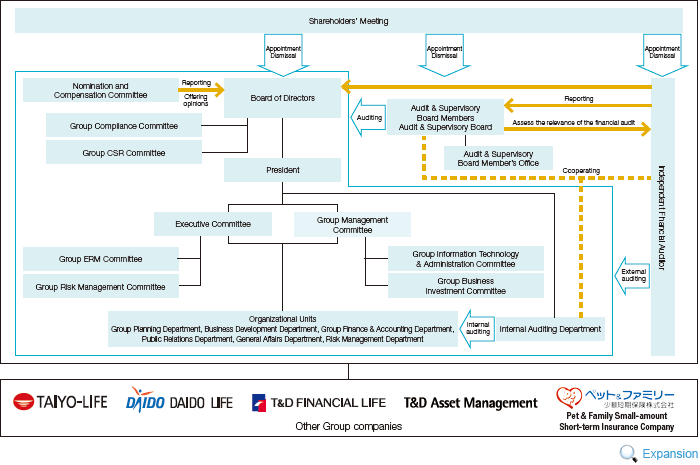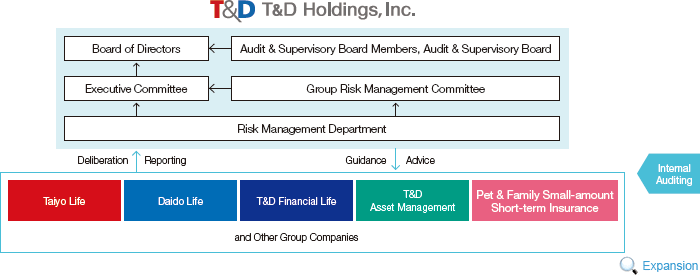Initiatives to Enhance Corporate Governance
The basic concept of corporate governance policy of the T&D Life Group (the “Group”) is to create efficient and transparent management systems to facilitate flexible and cohesive Group operations. Based on this thinking, the Group has been working to strengthen governance, including by appointing two or more outside directors, by formulating the independence criteria for outside directors, and by establishing the Nomination and Compensation Committee.
Moreover, the Group seriously respects the Corporate Governance Code that has been applied to listed companies since June 1, 2015. Based on the Group's commitment to all 73 principles of the Corporate Governance Code, T&D Holdings (the “Company”) has established its Basic Policy on Corporate Governance that sets forth the Company's initiatives and policies as they pertain to the core principles in the Corporate Governance Code.
The Company's Basic Policy on Corporate Governance comprises the following items. The Company works to ensure the T&D Life Group's sustained growth and the enhancement of its corporate value over the medium and long term through management practices that are based on this Basic Policy.
- Chapter 1
- General Provisions
- Chapter 2
- Corporate Governance System and Responsibilities of the Board of Directors and Other Bodies
- Chapter 3
- Ensuring Shareholder Rights and Equality, and Engaging in Dialogue with Shareholders and Other Stakeholders
- Chapter 4
- Collaboration with Stakeholders
- Chapter 5
- Disclosure of Information
Promoting Group Management
The role within the Group of the Company, which is the holding company, is to determine Group business and capital strategies and to ensure optimal allocation of resources within the Group. The Company is also responsible for the development and operation of oversight systems for managing profits, risks and capital at the Group level, including systems for accurately evaluating the operational risks of the five direct subsidiaries (the Group's three life insurance companies—Taiyo Life, Daido Life, and T&D Financial Life—as well as T&D Asset Management and Pet & Family Small-amount Short-term Insurance).
Based on an independent business strategy, each of the direct subsidiaries determines its own marketing strategies in line with its strengths. This approach seeks to maximize the corporate value of the Group by enabling each company to make the most of its autonomy and originality in its business operations.
In this way, the Group is committed to management that clarifies the respective roles and responsibilities of the Company and its direct subsidiaries.
Appointment of Outside Directors and Outside Audit & Supervisory Board Members
In line with the Basic Policy on Corporate Governance, the Company is committed to appointing two or more outside directors to appropriately reflect the opinions of individuals with extensive experience and knowledge in their capacity as outside corporate managers, legal experts and so forth in the Group's management policies and the development of internal controls and other systems as well as in the oversight of the execution of business. Accordingly, the Company has appointed two outside directors. In addition, the Company has established an Audit & Supervisory Board consisting of four audit & supervisory board members, two of which are outside audit & supervisory board members as provided by the Japanese Companies Act.
Further, the outside directors and outside audit & supervisory board members of the Company are registered with the Tokyo Stock Exchange as independent officers who are free of conflicts with the common interests of shareholders.
As a result of these initiatives, the Company believes that the outside directors and outside audit & supervisory board members are properly overseeing and serving as a control and that governance is functioning effectively. However, in order to bolster governance further, the Company will continue to look at ways to improve the approach to governance, taking into consideration examples and trends at other companies.
Nomination and Compensation Committee
The Company has established a Nomination and Compensation Committee as an advisory body to the Board of Directors for the purpose of discussing the fairness and appropriateness of the appointment and compensation of directors and audit & supervisory board members, among other related issues, as well as for ensuring the transparency of management and enhancing accountability.
The Nomination and Compensation Committee confirms the qualifications of the Company and core subsidiaries' director candidates, audit & supervisory board candidates, and the executive officers. The committee also deliberates on matters related to executive officers' compensation, and expresses its opinions to the Board of Directors.
The Nomination and Compensation Committee consists of the Representative Director and President and the outside directors. The committee chairman is one of the outside directors determined by mutual vote of the committee members.
Stock Compensation-type Stock Options (Stock Acquisition Rights)
The Company and the Group's three insurance companies have introduced stock compensation-type stock options (stock acquisition rights) for directors (excluding part-time directors which include outside directors) and executive officers, with the aim of boosting motivation to further contribute to the improvement of corporate value. These stock options will provide them with further incentives to work to stably and continuously improve the corporate value of the whole Group by aligning their interests more with shareholders, while they continue to manage the Company from a long-term standpoint.
Risk Management System
In light of the important social role played by its life insurance business, the Group considers the accurate assessment and control of risk to be a top management priority for ensuring sound and appropriate management. Under the guidance of the Company in accordance with their business characteristics and risk profile, each Group company carries out appropriate risk management based on the principle of self-responsibility.
Furthermore, the Group conducts integrated risk management through such means as utilizing risk management indicators based on economic value, which values assets and liabilities on a mark-to-market basis.
Basic Policy on Risk Management Systems
The Group has established a Group Risk Management Policy that sets forth the basic concepts for managing risk within the Group. Based on this policy, the three life insurance companies have upgraded their risk management systems, including those for affiliates.
The Company has established the Group Risk Management Committee, to integrate the management of risk within the Group. Moreover, the three life insurance companies are required to submit risk status reports based on integrated risk management indices periodically as well as on an as-needed basis. In this way, the Company is able to assess the various risks faced by individual Group companies.
Also, the Company reports the risk status of each Group company to the Board of Directors and, based on these findings, provides guidance and assistance to the three life insurance companies as necessary. This not only ensures that each of the companies conducts thorough risk management but also strengthens the management of risk for the Group as a whole.
Compliance
Basic Compliance Policies
The Group has formulated the T&D Life Group CSR Charter, the T&D Life Group Compliance Code of Conduct, and the T&D Life Group Basic Policy for Strengthening the Compliance Structure. The Group ensures that corporate officers and employees are conversant with these basic compliance policies and standards to promote rigorous Group-wide compliance efforts.
Internal Reporting System
The Group has established the T&D Life Group Helpline as an internal reporting system to ensure that actions that violate laws and regulations can be prevented or promptly recognized and corrected through direct reports from corporate officers, employees and other Group personnel. The T&D Life Group Helpline was established for use by all corporate officers and employees in the Group, and reports are submitted through an external independent company.
The Group has committed itself to not subjecting whistleblowers to any disadvantageous treatment because of their using the T&D Life Group Helpline or other channels to submit information to the audit & supervisory board members or the competent authorities and other third-party institutions, and is working to enhance the effectiveness of the system.
Accountability
The Company works to disclose information in line with the basic concept of striving to increase the transparency of management by appropriately disclosing corporate information, including appropriate financial information and non-financial information regarding management strategies, management priorities and other matters.
In specific terms, the Company strives to provide easy-to-understand disclosure based on its core disclosure principles of timeliness, fairness and accuracy in order to maintain and reinforce trust among all of its stakeholders, including customers, shareholders, employees, insurance agents, business partners, and local communities, and to increase the level of transparency in its corporate governance.
In releasing information, the Company strives to disclose information to as many people as possible using various media.
Furthermore, the Company is actively engaged in IR activities based on its IR policy, while ensuring that briefings are provided by members of senior management, in principle.
Basic Policy for Eliminating Antisocial Powers
In its Group Compliance Code of Conduct, the Group defines its policy toward antisocial powers as to “Reject and stringently respond to any antisocial powers and organizations that threaten the order and safety of civil society.” In accordance with this policy, the Group responds to antisocial powers in the following manner.
Basic Policy for Responding to Antisocial Powers
- 1. Respond as an Organization
- When antisocial powers make threats or demands, the Company responds as a unified organization, rather than delegating this responsibility to the related personnel or divisions. Further, the Company takes steps to ensure the safety of the corporate officers and employees responsible for dealing with such threats or demands.
- 2. Cooperate with External Experts
- The Company maintains close contact with external organizations, such as the police, the National Center for the Elimination of Boryokudan, and lawyers, to protect itself against the threats or demands of antisocial powers.
- 3. Avoid Contact
- The Company avoids making any contact with antisocial powers and does not conduct any transactions with these powers. Also, the Company does not cooperate with threats or demands from antisocial powers. The same avoidance of contact, transactions, or cooperation with antisocial powers applies to loans and other transactions conducted in alliance with other companies, such as credit sales firms.
- 4. Take Legal Action
- When necessary, the Company will take legal action in response to threats or demands from antisocial powers, including bringing civil and criminal charges against these powers.
- 5. Forbid Illegal Transactions and Provision of Funds
- Even in the event that the threats or demands of antisocial powers are in response to misdeeds in the Company's business operations or by its corporate officers or employees, the Company will not engage in illegal transactions with these powers to conceal this fact. Further, the Company will not provide funds to antisocial powers.


